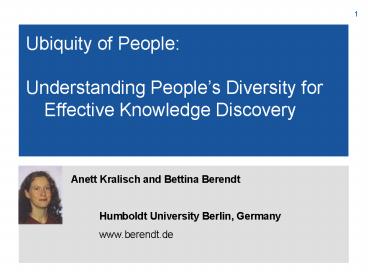Anett Kralisch and Bettina Berendt - PowerPoint PPT Presentation
1 / 14
Title:
Anett Kralisch and Bettina Berendt
Description:
Understanding People's Diversity for Effective Knowledge Discovery. 2 ... in Western settings, such as a nickname, might be considered extremely private. ... – PowerPoint PPT presentation
Number of Views:60
Avg rating:3.0/5.0
Title: Anett Kralisch and Bettina Berendt
1
Ubiquity of People Understanding Peoples
Diversity for Effective Knowledge Discovery
- Anett Kralisch and Bettina Berendt
- Humboldt University Berlin, Germany
- www.berendt.de
2
Ubiquitous information, computing, knowl.
discoveryVision 1
information technology
3
Ubiquitous information, computing, knowl.
discoveryVision 1
4
Ubiquitous information, computing, knowl.
discoveryVision 2
5
Ubiquitous information, computing, knowl.
discoveryVision 2
6
Motivation and Definition
- Ubiquity of people (PU) is
- prescriptive
- global access to information computing power
- worldwide markets
- the antonym of the digital divide
- descriptive
- diversities
- language
- culture
- economic and social status
- technological skills
- educational skills
- Why a new concept?
- PU as (one) bridge
- from technology, incl. ubiquitous computing
(mobile, embedded, etc.) - to the goal global access (equal access)
7
On method a research agenda for UKDUPU
- Identify KD-relevant behaviours that may be
affected by PU - Focus attention within PU operationalize PU ?
independent vars. - Collect findings, get new results by experiments,
data mining, ... - ? KD on ubiquitous-people behaviour
- Clarify goals of equal and ubiquitous access
- Propose actions
- ? KD for ubiquitous-people behaviour
- Evaluate actions
- Here
- X
- X
- X
- X
- ?!
- (some)
- ?!
- ?!
8
- People ubiquity
- and
- Knowledge Discovery
9
KD-relevant behaviours that are affected by PU
- People differ with respect to
- access to data and knowledge
- willingness and ability to share it
- evaluation of information
- This directly affects
- No. of variables in the user model, complexity of
context ??? - Data collection (can data be obtained? Which
data? How much noise is it likely to contain?) - Data processing (data is heterogeneous w.r.t.
breadth, depth, and semantics, noise) - Data/knowledge presentation (will it be
understood? Accepted?)
10
PU Independent variables investigated here
- Culture
- attitudes and behaviours of a group that are
relatively stable over time, - Often operationalized culture as (a property of )
a country or a collection of countries (nominal
or ordinal scale) - ? Part of user model?!
- Language
- Often L1 situation (access in native lang.) or
L2 situation (in non-native lang.) - ? Co-determined by user and environment ? part of
context model?! - Education / domain knowledge
- low, high inferred from demographic features
11
Exemplary findings Culture / privacy
- (Some of) Hofstedes (1991) Cultural Dimensions
- Individualism implies loose ties between the
members of a society collectivism implies that
people are integrated into strong, cohesive
groups - Power distance the extent to which less powerful
members of institutions and organisations accept
that power is distributed unequally - Findings
- Members of individualistic cultures tend to be
less willing to provide sensitive information
than members of collectivistic cultures (Milberg
et al., 2000). - Individualistic and collectivistic cultures also
differ in the type of information they provide
when negotiating identity - It is likely that in some cultural settings,
information considered highly personal by Western
standards, such as wealth or spending habits, may
be deemed open and public, whereas information
considered relatively innocuous in Western
settings, such as a nickname, might be considered
extremely private. (Burk 2004) - Members of high power distant countries are more
willing to provide data than members of low power
distant countries (Kralisch, 2006) - However, within high power distant societies,
knowledge sharing from high hierarchies to low
hierarchies is difficult since it would transfer
decision making authorities to subordinates
(Heier and Borgman, 2002).
12
Exemplary results Language domain knowledge /
Search and learning
- Web usage mining questionnaire results
(Kralisch
Berendt, 2005 Berendt, 2006) - L1 users and domain experts prefer search engine
and alphabetic search to content-organised search - L2 non-experts prefer content-organised search
- Content-organised search leads to the use of
content-semantics browsing ? incidental learning?!
13
- Outlook
- Open Questions
14
- PU calls for extensions to
- user and context modelling
- system design
- A more refined look at user and context models?
- Modifications in processing (data fusion from
heterogeneous sources) - Do these extensions only concern content (e.g.,
further attributes in user models, offers of
different layout options) or also formal aspects
of modelling and implementation details?
15
- Thank you for your attention!































